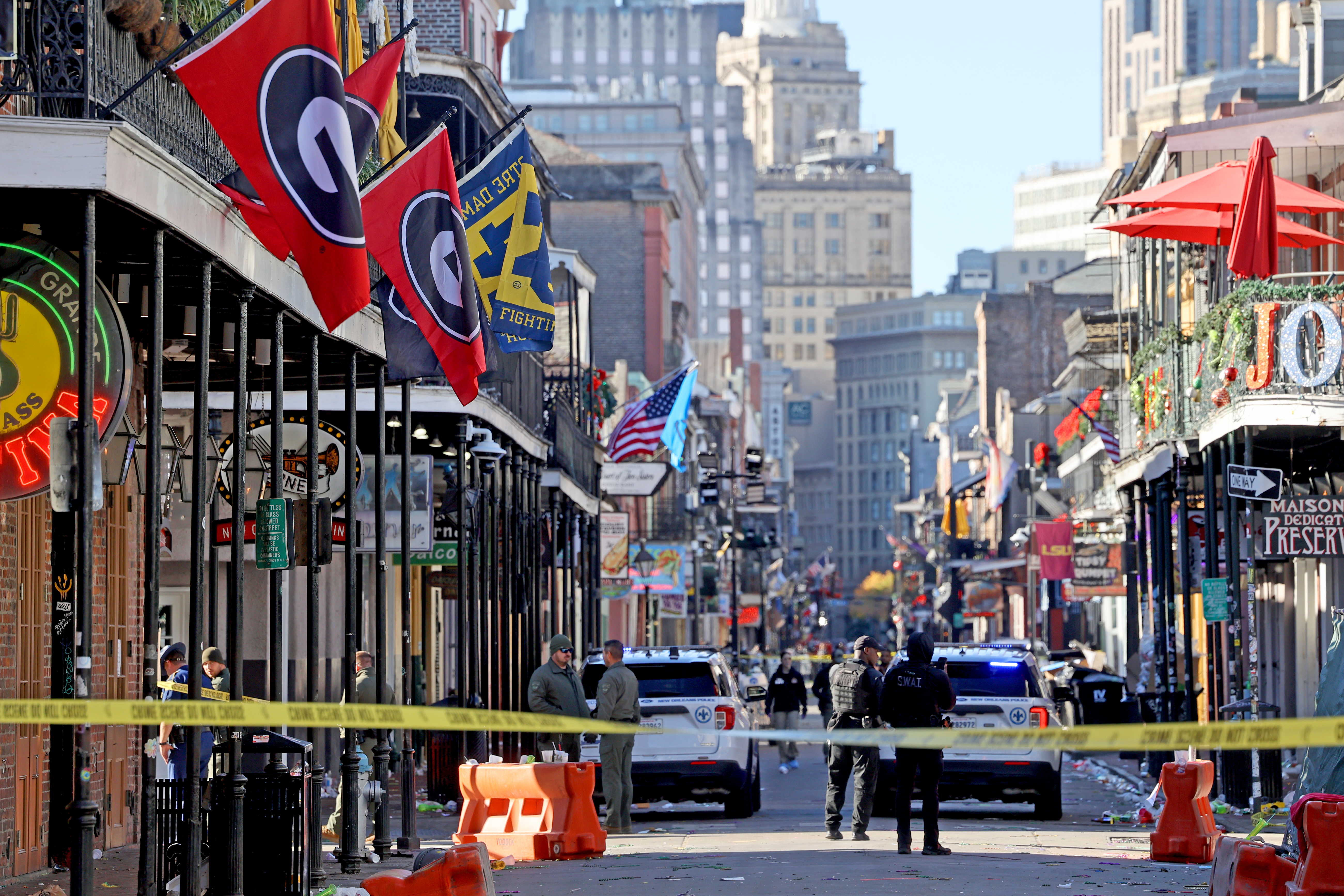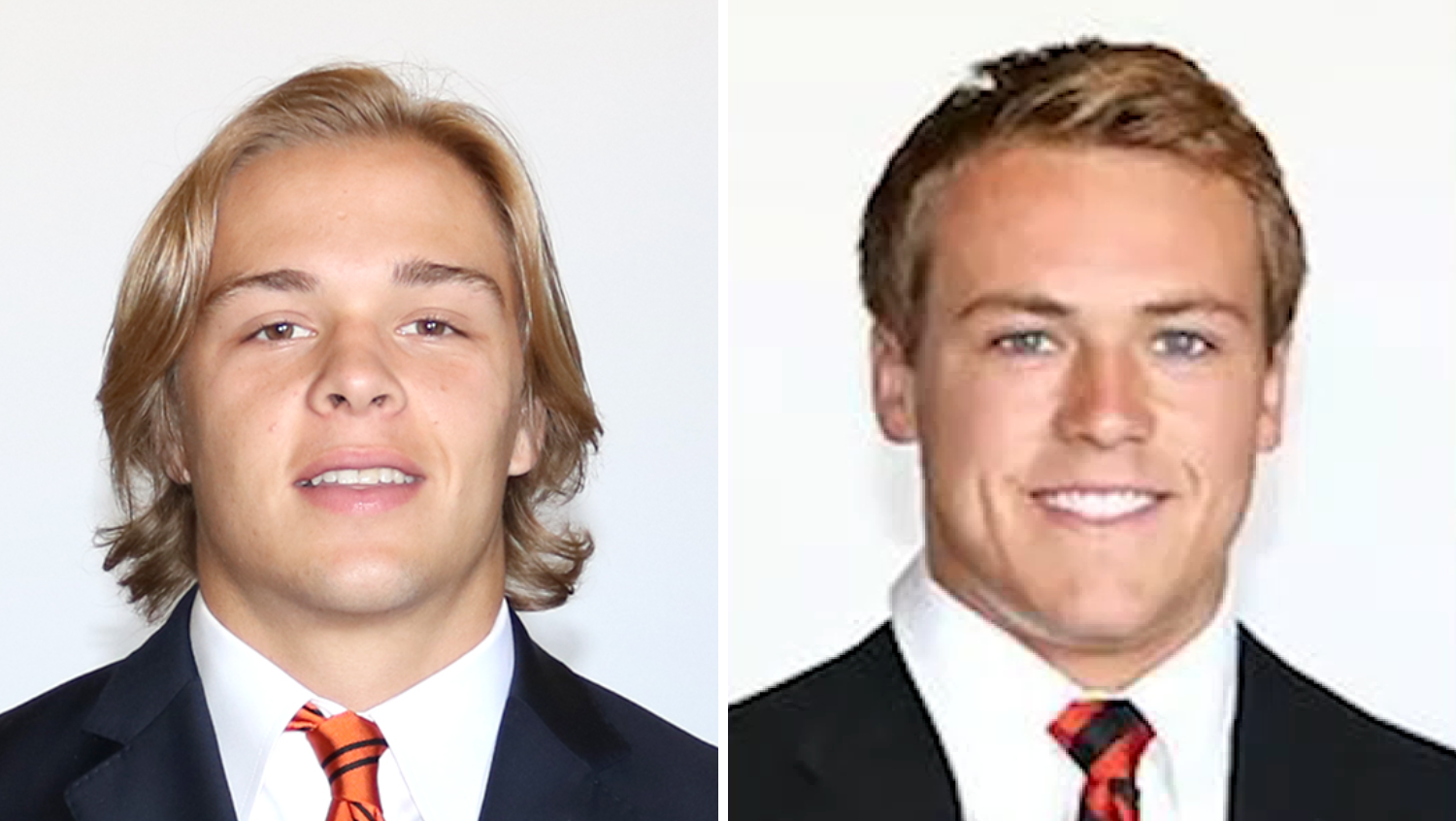The U.S. Army veteran who drove a pickup truck into a crowd of New Year’s revelers in New Orleans acted alone, the FBI said Thursday, reversing its position from a day earlier that he likely worked with others in the deadly attack that officials said was inspired by the Islamic State group.
The FBI also revealed that the driver, Shamsud-Din Jabbar, an American citizen from Texas, posted five videos on his Facebook account in the hours before the attack in which he proclaimed his support for the militant group and previewed the violence that he would soon unleash in the famed French Quarter district.
“This was an act of terrorism. It was premeditated and an evil act,” said Christopher Raia, the deputy assistant director of the FBI's counterterrorism division, calling Jabbar “100% inspired” by the Islamic State.
The attack killed 14 revelers, along with Jabbar, 42, who was fatally shot in a firefight with police after steering his speeding truck around a barricade and plowing into the crowd. About 30 people were injured.
Get top local stories in DFW delivered to you every morning. Sign up for NBC DFW's News Headlines newsletter.
It was the deadliest IS-inspired assault on U.S. soil in years, laying bare what federal officials have warned is a resurgent international terrorism threat. It also comes as the FBI and other agencies brace for dramatic leadership upheaval — and likely policy changes — after President-elect Donald Trump's administration takes office.
Raia stressed that there was no indication of a connection between the New Orleans attack and the explosion Wednesday of a Tesla Cybertruck filled with explosives outside Trump’s Las Vegas hotel. The person inside that truck, a decorated U.S. Army Green Beret, shot himself in the head just before detonation, authorities said.
The FBI continued to hunt for clues about Jabbar but said that a day into its investigation, it was confident he was not aided by anyone else in the attack, which killed an 18-year-old aspiring nurse, a single mother, a father of two and a former Princeton University football star, among others.
The attack plans also included the placement of crude bombs in the neighborhood in an apparent attempt to cause more carnage, officials said. Two improvised explosive devices left in coolers several blocks apart were rendered safe at the scene. Other devices were determined to be nonfunctional.
Officials reviewed surveillance video showing people standing near one of the coolers but concluded that they were not connected “in any way" with the attack, though investigators still want to speak with them as witnesses, Raia said.
At the press conference, Raia provided a timeline of the attack and additional information about the videos.
Investigators believe Jabbar picked up the rented Ford F-150 truck in Houston on Dec. 30, then drove from Houston to New Orleans the evening of Dec. 31. He posted several videos on an online platform “proclaiming his support for ISIS," Raia said. In the first of five videos that he posted on his Facebook account, with time-stamps starting at 1:29 a.m. and ending at 3:02 a.m., he said he “originally planned to harm his family and friends, but was concerned the news headlines would not focus on the ‘war between the believers and the disbelievers,’” Raia said.
Jabbar also stated that he joined IS before last summer, and he provided a last will and testament, the FBI said.
US & World
The rampage turned festive Bourbon Street into a macabre scene of maimed victims, bloodied bodies and pedestrians fleeing for safety inside nightclubs and restaurants. In addition to the dead, dozens of people were hurt.
Zion Parsons, 18, of Gulfport, Mississippi, said he saw the truck “barreling through, throwing people like in a movie scene, throwing people into the air.”
“Bodies, bodies all up and down the street, everybody screaming and hollering,” said Parsons, whose friend Nikyra Dedeaux was among the people killed.
“This is not just an act of terrorism. This is evil,” New Orleans Police Superintendent Anne Kirkpatrick said.
The driver “defeated” safety measures in place to protect pedestrians, Kirkpatrick said, and was “hell-bent on creating the carnage and the damage that he did.”
Jabbar drove the rented pickup truck onto a sidewalk, going around a police car that was positioned to block vehicular traffic, authorities said. A barrier system meant to prevent vehicle attacks was being repaired in preparation for the Super Bowl in February.
Jabbar was killed by police after he exited the truck and opened fire on responding officers, Kirkpatrick said. Three officers returned fire. Two were shot and are in stable condition.
Investigators recovered a handgun and AR-style rifle, according to a law enforcement official who was not authorized to discuss the investigation publicly and spoke on condition of anonymity.
Investigators also found three cellphones linked to Jabbar and two laptops at home in nearby Mandeville, that is believed to be potentially connected to the Bourbon Street attack.
“Digital media exploitation is a priority to see what is on the devices and determine if there are any other potential leads,” Raia said.
A photo circulated among law enforcement officials showed a bearded Jabbar wearing camouflage next to the truck after he was killed. The flag of the Islamic State group was on the truck's trailer hitch, the FBI said.
“For those people who don’t believe in objective evil, all you have to do is look at what happened in our city early this morning," U.S. Sen. John Kennedy, a Louisiana Republican, said. "If this doesn’t trigger the gag reflex of every American, every fair-minded American, I’ll be very surprised.”
Jabbar joined the Army in 2007, serving on active duty in human resources and information technology and deploying to Afghanistan from 2009 to 2010, the service said. He transferred to the Army Reserve in 2015 and left in 2020 with the rank of staff sergeant.
A U.S. government official, speaking on condition of anonymity because the official was not authorized to speak publicly, said Jabbar traveled to Egypt in 2023, staying in Cairo for a week, before returning to the U.S. and then traveling to Toronto for three days. It was not immediately clear what he did during those travels.
Abdur-Rahim Jabbar, Jabbar's younger brother, told The Associated Press on Thursday that it “doesn’t feel real” that his brother could have done this.
“I never would have thought it’d be him,” he said. “It’s completely unlike him.”
He said that his brother had been isolated in the last few years, but that he had also been in touch with him and he didn’t see any signs of radicalization.
“It’s completely contradictory to who he was and how his family and his friends know him,” he said.
Chris Pousson, 42, of Beaumont, Texas, said he became friends with Shamsud-Din Jabbar in middle school, describing him as someone who was quiet and reserved and did not get into trouble.
After high school, he said, they reconnected on Facebook around 2008 or 2009 and would message back and forth throughout the next decade.
“If any red flags would have popped off, I would have caught them, and I would have contacted the proper authorities,” he said. “But he didn’t give anything to me that would have suggested that he is capable of doing what happened.”
Hours after the attack, several coroner’s office vans were parked on the corner of Bourbon and Canal streets, cordoned off by police tape with crowds of dazed tourists standing around, some trying to navigate their luggage through the labyrinth of blockades.
“We looked out our front door and saw caution tape and dead silence and it’s eerie,” said Tessa Cundiff, an Indiana native who moved to the French Quarter a few years ago. "This is not what we fell in love with, it’s sad.”
President Joe Biden, speaking from the presidential retreat at Camp David, addressed the victims and the people of New Orleans: “I want you to know I grieve with you. Our nation grieves with you as you mourn and as you heal.”
“My heart goes out to the victims and their families who were simply trying to celebrate the holiday,” Biden said in an earlier written statement. “There is no justification for violence of any kind, and we will not tolerate any attack on any of our nation’s communities.”
In New Orleans on Thursday, a still-reeling city inched back toward normal operations. Authorities finished processing the scene early in the morning, removing the last of the bodies, and Bourbon Street — famous worldwide for music, open-air drinking and festive vibes — reopened for business by early afternoon.
The Sugar Bowl college football game between Notre Dame and Georgia, initially set for Wednesday night and postponed by a day in the interest of national security, was played Thursday evening. The city also planned to host the Super Bowl next month.
New Orleans "is not only ready for game day today, but we’re ready to continue to host large-scale events in our city because we are built to host at every single turn,” New Orleans Mayor LaToya Cantrell said.
NBC News contributed to this report.
Tucker reported from Washington, and Mustian reported from Black Mountain, North Carolina. Associated Press reporters Stephen Smith, Chevel Johnson and Brett Martel in New Orleans; Jeff Martin in Atlanta; Rebecca Santana, Alanna Durkin Richer, Tara Copp and Zeke Miller in Washington; Kristie Rieken in Beaumont, Texas; Darlene Superville in New Castle, Delaware; Colleen Long in West Palm Beach, Florida; and Michael R. Sisak in New York contributed to this report.




